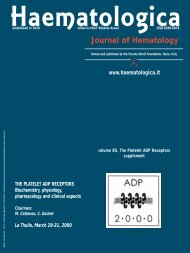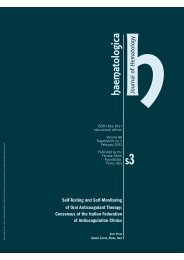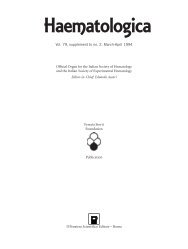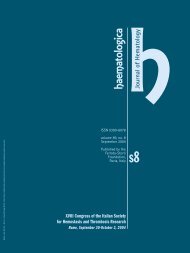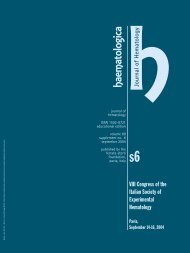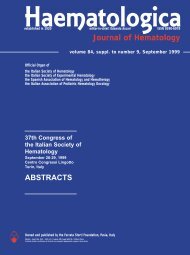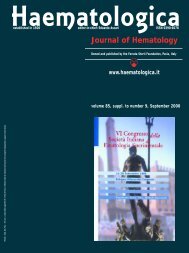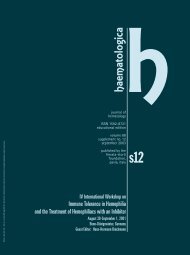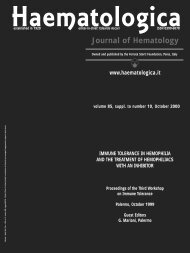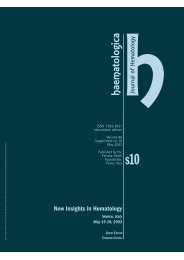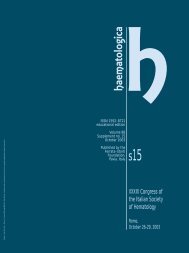Haematologica 2003 - Supplements
Haematologica 2003 - Supplements
Haematologica 2003 - Supplements
Create successful ePaper yourself
Turn your PDF publications into a flip-book with our unique Google optimized e-Paper software.
Figure 3b. Event-free Survival<br />
4-Year<br />
Events / N Estimate<br />
TTII 74 / 231 63% (55,70)<br />
TTI 196 / 231 34% (29,41)<br />
Logrank P-value < .0001<br />
100%<br />
80%<br />
60%<br />
40%<br />
20%<br />
0%<br />
0 3 6 9 12<br />
Years After Enrollment<br />
12. Role of novel therapies targeting the<br />
myeloma cell and its marrow<br />
microenvironment<br />
Roundtable I<br />
P12.1.1<br />
ROLE OF NOVEL THERAPIES TARGETING THE<br />
MYELOMA CELL AND ITS MICROENVIRONMENT<br />
Anderson KC<br />
Novel agents targeting MM cells in the BM, including<br />
Thalidomide (Thal) and ImmunomoduIatory Analogs<br />
Thal/IMiDs: induce G1 growth arrest/apoptosis of drug resistant<br />
MM cells via inhibiting NF-κB and activating caspase 8; inhibit<br />
adhesion of MM cells to BM stromal cells (SCs); inhibit<br />
bioactivity and/or secretion in MM cells and/or BMSCs of<br />
cytokines; inhibit angiogenesis; induce T cell and NK cell anti-<br />
MM immunity; and decrease human MM cell growth in a SCID<br />
mouse model. IMiD (Revamid) is more potent in preclinical<br />
studies and achieved stable disease or response in 79% patients in<br />
phase I study of relapsed refractory MM without somnolence,<br />
constipation, or neuropathy; it achieved responses, including<br />
CRs, in phase II trials. Phase III trial is comparing Dex/placebo<br />
versus Revimid/placebo in relapsed MM. The proteasome<br />
inhibitor PS-341 (Velcade): inhibits 26S proteasome activity;<br />
induces apoptosis via caspase-8, 9, and 3 in drug resistant MM<br />
cells; downregulates adhesion molecules and binding of MM<br />
cells and BMSCs; blocks constitutive and adhesion-induced NFκB<br />
dependent cytokine secretion in BMSCs; and inhibits<br />
angiogenesis. PS-341 downregulates growth and survival gene<br />
transcription; and induces apoptotic, ubiquitin/proteasome, and<br />
stress response gene transcripts. Proteomics shows that PS-341<br />
inhibits DNA repair kinases, and it can overcome resistance to<br />
DNA damaging agents. PS-341 induced cleavage of gp130 may<br />
account for MM sensitivity. PS-341 inhibits human MM cell<br />
growth, decreases angiogenesis, and prolongs survival in SCID<br />
mice. Anti-MM activity was observed in phase I trials, and a<br />
phase II trial of PS-341 in refractory relapsed MM achieved 35%<br />
responses (10% CR, near CR). Responses were durable (12<br />
months) and associated with clinical benefit: improved quality of<br />
life; increased hemoglobin and decreased transfusions; stable<br />
renal function; and increase in normal immunoglobulin levels.<br />
PS-341 is being compared with Dex in phase III trial for relapsed<br />
MM. Other agents include Arsenic Trioxide, 2-Methoxyestradiol,<br />
and Lysophosphatidic Acid Acyltransferase -β Inhibitors. Novel<br />
agents targeting MM cell signaling cascades include VEGFR<br />
tyrosine kinase inhibitor PTK787/ZK222584; Farnesyltransferase<br />
Inhibitors; Histone Deacetylase Inhibitors suberoylanilide<br />
hydroxamic acid and cinnamyl hydroxamic acid LAQ824; and<br />
Heat Shock Protein-90 Inhibitors alone or to enhance response to<br />
PS-341. Novel agents targeting BM include IκB Kinase Inhibitor<br />
PS-1145 and p38 MAPK inhibitor which do not inhibit growth of<br />
isolated MM cells, but do block tumor growth and cytokine<br />
secretion in BM. Novel agents targeting cell surface receptors<br />
include Tumor Necrosis Factor -Related Apoptosis-Inducing<br />
Ligand/Apo2 Ligand; Insulin-like growth factor -1 receptor<br />
inhibitors to overcome cytokined-induced growth, survival, and<br />
drug resistance; Statins to disrupt upstream lipid raft and<br />
downstream growth signaling; and anti-CD 20 against CD20 +<br />
MM cells. These novel agents, used alone or in combination with<br />
conventional or other novel agents, offer great promise to<br />
S75



